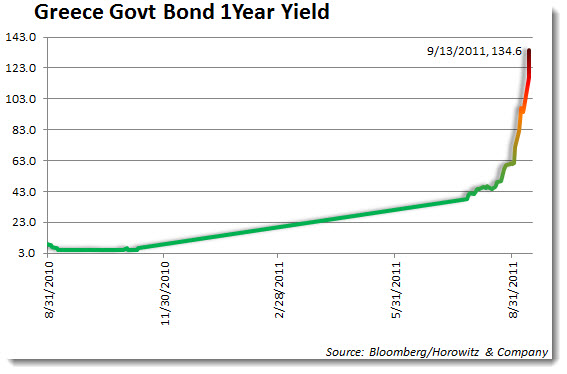During the month of September, we are going to be adding a special section to this site.
The TDI Managed Growth Strategy provides a private “client-only” blog where we discuss the day and our general outlook. Areas that we cover range from current holdings analysis, economic reports, political commentary and more.
The primary purpose of the “client-only” blog is provide information so that clients for whom we manage money will have a better understanding of what is the rationale for portfolio decisions. In addition, the information is designed to be educational so that readers can learn from both our mistakes and successes.
On a daily basis, simply follow www.thedisciplinedinvestor.com or use an RSS reader and point it to : http://tinyurl.com/3u3jahy or http://www.thedisciplinedinvestor.com/blog/category/stocks/insideedition/feed/
As my Grandmother would say: OY VEYASMEAR. You have to imagine her saying this as her hands were on her cheeks and she bobbed here head to and fro. This was a signal that she was amazed and bewildered about something and it usually was not a good sign. Grandma knew best and she had a sense about what was occurring around her.
I bet that she would wake at her usual time at around 4am and get a nice hot cup of tea. Then she would take a look at the news on her iPhone or Blackberry (go with me here) and if it was last night, she would see that the Asian markets were generally not doing well due to a high level of fear about the EuroZone. She then notices the price of the Euro… Wasn’t it just a few hours ago that Asia was going to buy Italy, she thought?

After the cup of tea, she would go back to bed and wake up again at 7am or so. Now, the situation is totally different. She wonders if she had actually been up at 4am or if it was all a dream. How could a currency rise and fall this much in such a short period of time, she pondered?
All good questions and the answers are no different than they were yesterday or last week, or even last month. Traders are trying to get ahead of the news and hope to make a fortune betting that the EuroZone will crash and burn or rise from the ashes. Since the overnight sessions are much thinner than the regular session, the swings are much greater. Oh, and the fact that EuroZone finance officials can’t seem to come together with a plan to calm investors does not help. Confidence in Sarkozy and Trichet is low (as it should be) so their word does not hold as much weight these days.
Some of the news items that seem to have a grip on the direction of markets (sources, IBD, WSJ, NYT):
Odds Of Greek Default are now nearing 98%
The 1-year Greek debt yields spiked above 135% as investors priced in a 98% chance that Athens will default. European bank stocks dove again on fears that they‘ll suffer big losses on sovereign debt holdings. Greece planned a new property tax to try to cut deficits in time to appease international lenders, but workers already threatened to quash it.
Point of No Return (of principal)?
Bank of America Plans To Cut 30,000 Jobs
The “New BAC” plan aims to slash $5 bil out of annual costs of $27 bil. Bank of America (BAC) confirmed plans to lop off 30,000 jobs over the next few years. The largest U.S. bank by assets is scrambling to cover mortgage-related claims and expenses. The bank said it will rely partly on attrition to achieve its goal.
Tax Hikes Linked To Jobs Plan
Pres. Obama is mulling a series of tax hikes, mainly on the wealthy, to help cover the cost of his new $447 bil jobs plan, budget chief Jack Lew said. Obama proposes raising $400 bil over 10 years by placing new limits on itemized deductions, Lew said. Other revenues would come from raising various taxes, including on corporate jet owners, the oil and gas industry and private equity.
U.S. Growth Outlook Slashed
The National Assoc. for Business Economics members polled see GDP growing 1.7% this year and 2.3% in ‘12, both about a percentage point below their May forecast. The economists also hiked jobless rate and inflation targets. High unemployment, federal deficits and the euro zone debt crisis were top concerns, NABE said.
There has been a good deal commentary and opinion coming out about the potential for a Greek default:
Greece should default on its bonds to stop a deterioration of the economy, said Mario Blejer , a former Bank of England adviser who took the reins of Argentina‘s central bank after its 2001 default on $95 billion.
“Greece should default, and default big,” Blejer, who was an adviser to Bank of England Governor Mervyn King from 2003 to 2008, said in an interview in Buenos Aires. “You can‘t jump over a chasm in two steps.”
Note: A similar commentary was heard at 2pm by the Dutch Finance Minister, Jan Kees de Jager. (Although about 15 minutes later he denies that comment)
In yesterday’s update we had promised some information about the investment in Peru. We are holding the iShares Peru ETF (EPU) for a variety of reasons. One of the better performing markets over the past few months, this has a good deal of momentum during a time that there is a good deal of pain being felt by other emerging markets. Here are a few key facts about the country:
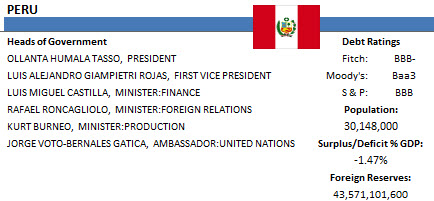
Unemployment Rate: 7.00
Central Bank Rate: 4.25
Annual GDP: 8.8%
Real GDP: 5.3%
GDP Per Capita: 3,136
Significant Industry: Agriculture
Currency: Peruvian New Sol
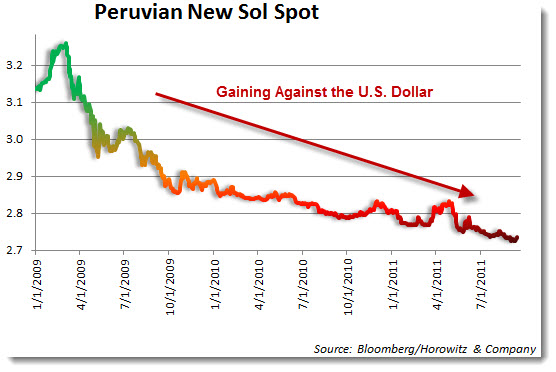 The Peruvian Lima Stock Index has had a pretty impressive run:
The Peruvian Lima Stock Index has had a pretty impressive run:
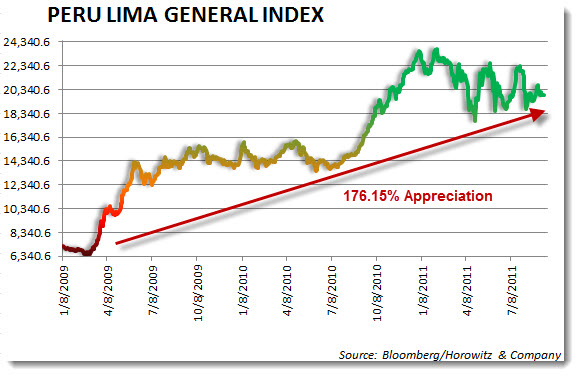
If you thought that there was volatility over on this side of the Atlantic, take a look at the range of Germany’s DAX index Tuesday:
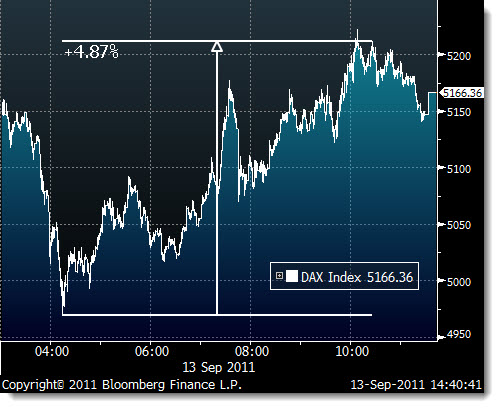
In an attempt to provide some re-assurance to the global markets, Treasury Secretary Timothy F. Geithner will urge European governments to step up their crisis- fighting efforts amid Obama administration concerns that deteriorating conditions in the region may hurt the U.S. economy. The problem is that Mr. Geithner has more credibility as a financial knee-capper than anything else. His visit will surely prove to be interesting as there is generally a quick response (even if it does nothing more that calm markets for a day or so) when he ‘pays a visit’ to a country that is causing problems for the U.S. economy.
In a return to Monday’s broo-ha-ha that provided an artificial lift to U.S. markets, it has now become clear that the rumor about China buying Italian assets is in the process of being quashed.
(Bloomberg) — China shouldn‘t buy bonds issued by individual euro-area countries because their leaders and the European Central Bank are in disarray, said Yu Yongding , a former adviser to China‘s central bank. “China has to wait until it can see a clearer road map by euro countries for solving sovereign-debt problems,” Yu, who is based in Beijing, said in e-mailed comments today. The nation is not a lender of last resort for “troubled countries,” he added.
___
Latest Podcast Episode: TDI Podcast: Should I Sell, Buy, Cry? $450,000 PER JOB? How To Hedge (#229)
___


